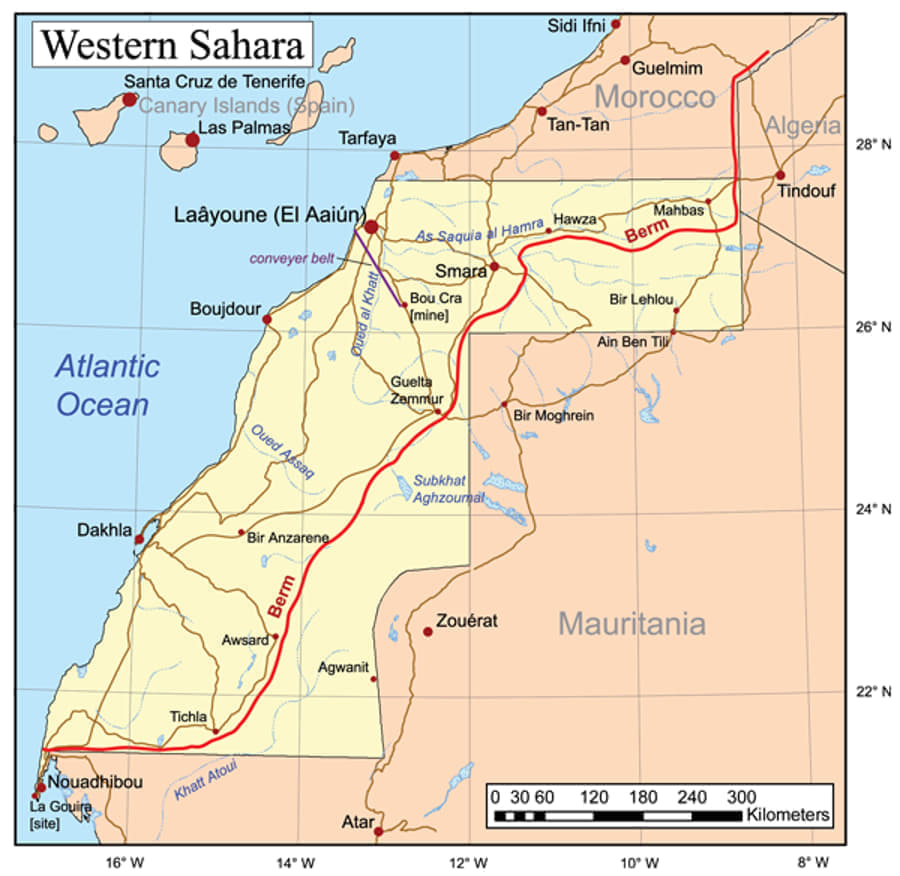Numerous setbacks, criticisms and scandals have haunted and continue to haunt the coalition government, led by Pedro Sanchez, which currently aspires to extend its mandate for another four years. Undoubtedly, one of the most prominent chapters of this government centers on the Western Sahara issue. The decision taken by Sanchez in March 2022 stands as the epicenter of a political earthquake that has left its footprints in the middle of the Sahrawi desert.
In the 1970s, Spain surprisingly opted to abandon what was until then known as its fifty-third province, the Spanish Sahara. This move also implied disengaging from its commitments to the Sahrawi population and to international legality, which expected the Spanish state to lead an organized decolonization process, culminating in the declaration of independence of Western Sahara. Instead, however, Spain was forced to hand over that rich territory to an expansion-hungry Morocco, which used its usual tactics of pressure, blackmail and machinations, with the collaboration of the United States and France, to prevent decolonization from taking place.
From Spain, it was argued that this shameful abandonment of the Sahrawi people was due to a complicated period in the country’s history, with Franco’s agony and an uncertain future. In that context, yielding to the blackmail of King Hassan II and his allies seemed almost inevitable, as advantage was taken of the moment of weakness and uncertainty in Spain. This explanation, to some extent, may have some merit. However, what is completely incomprehensible is the position taken by the President of the self-styled “most progressive government in history,” Pedro Sanchez, who publicly endorsed, in March 2022, the idea that the Western Sahara should become an autonomy under Moroccan sovereignty. This position justifies and supports an occupation that has been labeled illegal by all international courts and bodies. It is a new betrayal of the Sahrawi people, who have seen Spain abandon them once again.
Beyond the opinions and personal views that I may have as a Sahrawi, it is undeniable that if we evaluate the situation from an impartial perspective and considering the strategic and geopolitical interests at stake, Sanchez’s decision not only represents a betrayal to the Sahrawi people, but also to the Spanish people. This is because it clearly fuels Moroccan expansionism, which constitutes a continuous threat to the Spanish cities of Ceuta and Melilla. At times, Morocco even claims the Canary Islands and their maritime space as part of its territory. This represents a clear danger to the integrity of the Kingdom of Spain.
José Manuel Albares, who holds the highest responsibility in the Spanish government’s foreign policy, has made it clear that his main duty and priority is to serve his monarch and master, His Majesty Mohammed VI. This loyalty persists, even when it is known that the Moroccan intelligence services spied on half of the Spanish government using Pegasus software. It persists, despite the serious consequences derived from the immigration that Morocco constantly directs towards the Spanish coasts. It persists, despite the contempt and humiliation on the part of a monarch who did not even bother to receive the Spanish President in what was announced as the most important Spain-Morocco summit in many years. Nothing seems to disturb or modify Albares’ loyalty towards Morocco.
This murky relationship raises many questions, not only about Minister Albares’ relationship with Morocco, but also about the PSOE and its continued submission to Rabat, a submission that seems to lack all logic. If it is necessary to break with Algeria, it is broken. If it is necessary to buy more gas from Russia, it is bought. If it is necessary to sell to the Sahrawis, it is sold. If it is necessary to remain silent and accept humiliation, one remains silent and accepts it. “If you have to swallow toads, you swallow them,” as the socialist López Aguilar said. But what if it is a question of handing over Ceuta and Melilla, will they be handed over? It is clear that when it comes to the PSOE and Morocco, anything is possible; anything Morocco wishes.
What every Spanish citizen should keep in mind is that problems with Morocco will always be a constant on the agenda. The cession, submission and friendly approach towards the Rabat regime only strengthen its hostile positions against Spain, and sooner or later this could explode in the form of a diplomatic crisis, migratory waves or territorial disputes. If Spain really wants to safeguard its geostrategic interests and protect its territories from the Moroccan expansionist threat, it must start implementing a firmer policy towards Morocco immediately. It must be uncompromising and play its cards on the complex geopolitical chessboard, seeking an alliance with Algeria and supporting an independent Sahrawi Republic. Such an alliance could mark the beginning of the end of the Moroccan regime, which poses a constant threat to all its neighbors.
Taleb Alisalem was born in the Sahrawi refugee camps and grew up in Spain. He trained in International Cooperation and Development Aid at The Open University. He is a prominent political activist and analyst who specializes in the Western Sahara, the Middle East as well as African issues. This article appears courtesy of Posmodernia.
